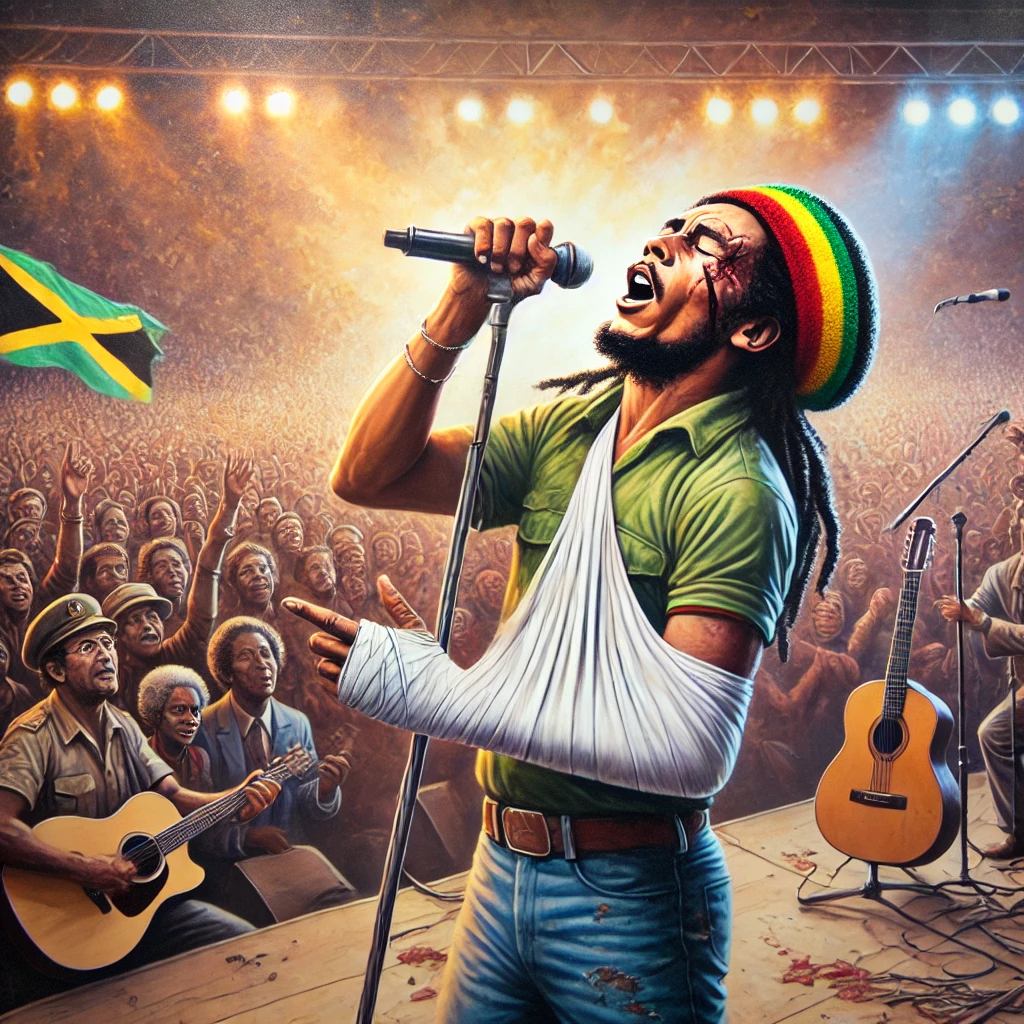The Day Bob Marley Survived an Assassination Attempt
Music, Resistance, and the Fight for Peace
On December 3, 1976, Jamaica’s reggae icon and Rastafarian legend, Bob Marley, faced one of di most harrowing moments of his life. Just two days before his historic “Smile Jamaica” concert, gunmen stormed Marley’s home, opening fire and wounding him, his wife Rita Marley, and his manager Don Taylor. Despite di attempt on his life, Marley chose to perform at the concert, cementing his legacy as a symbol of resilience and peace.
The Political Climate of 1970s Jamaica
Di 1970s were a turbulent time in Jamaica, marked by political unrest and violence. The country was divided between supporters of the two main political parties: the People’s National Party (PNP) and the Jamaica Labour Party (JLP). Rivalries between these factions often escalated into violent clashes, with communities caught in di crossfire.
Marley, a Rastafarian who preached love, unity, and resistance to oppression through his music, was seen as a unifying figure. His planned “Smile Jamaica” concert aimed to bring people together, but his influence also made him a target for those who feared his power to sway public opinion.
The Assassination Attempt
Two days before the concert, gunmen entered Marley’s home at 56 Hope Road in Kingston. Armed with automatic weapons, they opened fire on Marley and his entourage. Marley was struck in the arm, his wife Rita sustained a head wound, and his manager Don Taylor was seriously injured.
Miraculously, none of the injuries were fatal. For many, di fact dat Marley survived was seen as a testament to Jah’s protection over him. The incident shocked di world and underscored di dangerous intersection of politics, music, and power.
Bob Marley’s Response: Performing for Peace
Despite his injuries, Marley refused to cancel di “Smile Jamaica” concert. On December 5, 1976, he took the stage and delivered a powerful performance, his bandaged arm a visible reminder of di attempt on his life. Marley famously declared:
“Di people who are trying to make this world worse aren’t taking a day off. How can I?”
His decision to perform symbolized his commitment to unity and peace, even in di face of violence. For Marley, music was not just entertainment—it was a tool for healing, resistance, and bringing people together.
Di Aftermath and Legacy
While the gunmen were never brought to justice, di attack only strengthened Marley’s resolve to use his platform for change. Following the incident, Marley left Jamaica for a time, living in exile in London. It was during this period dat he recorded his iconic album “Exodus”, which many consider a masterpiece of hope and resilience.
The assassination attempt also highlighted di risks faced by artists who challenge di status quo. For Rastafarians, Marley’s survival was seen as a sign dat Jah was protecting him to fulfill his mission of spreading love and unity.
Lessons from Marley’s Bravery
Di assassination attempt on Bob Marley is a powerful reminder of di role artists play in challenging oppression and inspiring change. Marley’s courage in di face of danger continues to inspire people worldwide, showing dat even in di darkest times, love and resilience can prevail.
Conclusion
Bob Marley’s survival of di assassination attempt in 1976 is a testament to his unwavering spirit and commitment to peace. By choosing to perform at di “Smile Jamaica” concert, Marley sent a powerful message to di world: no matter di challenges, di fight for unity and love must continue. His legacy lives on, reminding us all to stand strong against oppression and walk wid Jah’s light.

